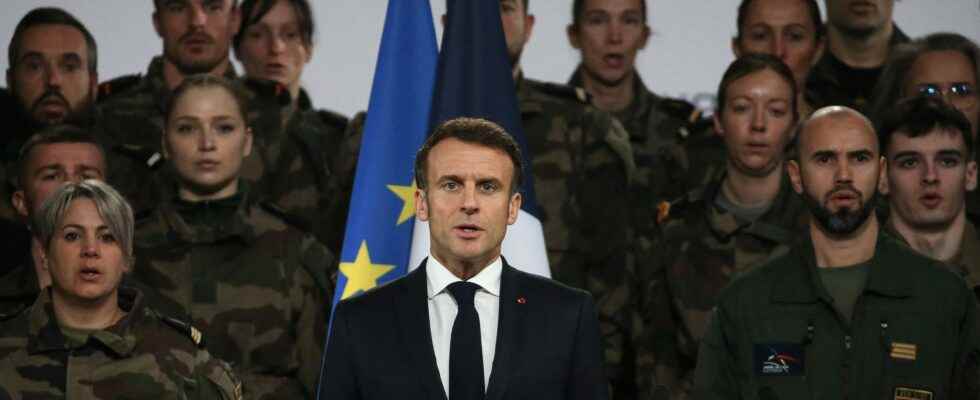The increase is considerable. This Friday, January 20, during his wishes to the armies, on the air base of Mont-de-Marsan (Landes), Emmanuel Macron announced his wish to increase the resources of the armies to 413 billion over seven years. This one-third increase in the budget will have to be voted on during the military programming law for the years 2024 to 2030, scheduled for March 2023. “We must have a war in advance” to “be ready for wars more brutal, more numerous and more ambiguous at the same time”, commented the President of the Republic in front of senior officers. With L’Express, Michel Goya, former colonel of the navy troops, also a consultant for BFMTV, welcomes the orientation but regrets an insufficient increase in his eyes. In unison with part of the military world. Interview.
L’Express: Emmanuel Macron has announced an increase in the budget of the armies to the tune of 17 billion euros per year. It is considerable. Is this enough, given the challenges France has to face?
Michael Goya: No. Of course, we must salute the efforts made. Since 2015, we have been struggling to emerge from the crisis in which the armies have been plunged since 1990. It is commendable. But if you ask me if it’s enough, I say no. We remain below 3% of GDP, below what the army budget was in 1990. However, we know that at less than 3% of GDP, it is difficult to renew equipment. By way of comparison, Poland will devote 5% of its budget to the armies, and in the United States, it is 3.6%. We were so low that we are still catching up. It will also be necessary to deduct from this budget the cost of inflation if, as I think, this budget is made at current and not constant euros.
Concretely, what is the risk for France, is it that of downgrading on the international scene?
Yes, in a way. We risk not being on the level. Take the case of army ammunition. We are currently in a situation of extreme vulnerability. Can we say that this budget increase will make it possible to put an end to it, that we will no longer have inventory problems? No, we can’t say that. The truth is that there is no format change. We are not preparing for a major war.
But we have the nuclear deterrent which prevents us from being attacked on our territory. Under these conditions, would it not be exaggerated to increase the army budget by 25 or 30 billion euros? Because that would mean lowering the budget of other ministries, such as national education, justice or the police.
In the short term, we can indeed understand this decision. But that’s short-sighted, in my opinion. Let us compare with the Americans: if we brought our effort to their level, that would mean that the budget of our armies would amount to 92 billion euros per year. That is to say 50 billion more than today. On the other hand, increasing the budget of the armies is not so expensive because you have a return on investment. You export what you produce, and you create jobs. These are also industries that cannot be relocated. Otherwise, we will lose influence on the international scene. Why not, but we would have to assume that we are reducing our international ambitions, that we are no longer concerned with world affairs.
Emmanuel Macron announced a singular increase in the budgets devoted to military intelligence and cyber. Do you welcome this strategy?
Of course, this is going in the right direction. This discourse takes into account the new rules of the game, what I call “confrontation”, that is to say a level of confrontation just below that of open warfare, with unconventional means. But many of us have been saying this for six or seven years. This announcement therefore comes a little late. Above all, I maintain that we must also develop conventional means, to create fear. For example, the army artillery. Our equipment is very good, starting with the famous Caesar guns, but we have very small quantities. These announcements will not change scale. If we have to supply it to friendly countries, like Ukraine, how do we do it? We won’t have enough for us.
The Head of State also called on manufacturers to lower the cost of equipment, even if it were less sophisticated. This is a discourse that you have held for several years. How to do it ?
What is certain is that we must force the hand of manufacturers. Spontaneously, they will always tend to do very technological, very expensive, very long to produce. We have to push them out of this logic. And then, for certain products, we must not hesitate to keep strategic stocks, so as to be able to produce in France as much as possible. Because if we get angry with the supplier countries, what do we do?
